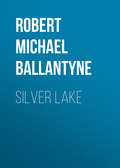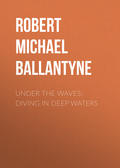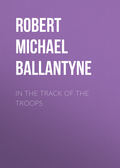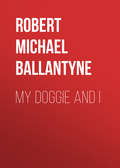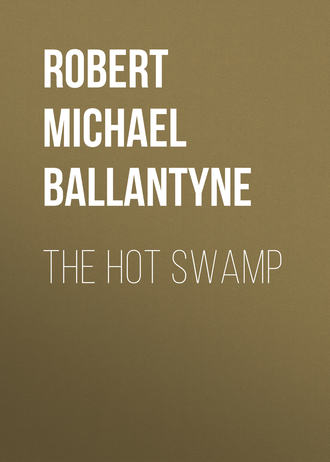
Robert Michael Ballantyne
The Hot Swamp
Chapter Thirty Two
Branwen Visits Gunrig
Before going off on his mission the Hebrew paid a visit to his own residence, where he found Branwen busy with culinary operations. Sitting down on a stool, he looked at her with an expression of mingled amusement and perplexity.
“Come hither, my girl,” he said, “and sit beside me while I reveal the straits to which you have brought me. Verily, a short time ago I had deemed it impossible for any one to thrust me so near to the verge of falsehood as you have done!”
“I, Beniah?” exclaimed the maiden, with a look of surprise on her pretty face so ineffably innocent that it was obviously hypocritical—insomuch that Beniah laughed, and Branwen was constrained to join him.
“Yes—you and your father together, for the puzzling man has commissioned me to set out for the Hot Swamp, to tell Bladud that he is urgently wanted at home. And he would not even allow me to open my lips, when I was about to broach the subject of your disguises, although he almost certainly knows all about them—”
“What! my father knows?” interrupted Branwen, with raised eyebrows.
“Yes, and you know that he knows, and he knows that I know, and we all know that each other knows, and why there should be any objection that every one should know is more than I can—”
“Never mind, Beniah,” interrupted the girl, with the slightest possible smile. “You are a dear, good old creature, and I know you won’t betray me. Remember your solemn promise.”
“Truly I shall not forget it soon,” replied the Hebrew, “for the trouble it has cost me already to compose answers that should not be lies is beyond your light-hearted nature to understand.”
“Ah! yes, indeed,” rejoined Branwen, with a sigh of mock humility, “I was always very lighthearted by nature. The queen used frequently to tell me so—though she never said it was by ‘nature,’ and the king agreed with her—though by the way he used to laugh, I don’t think he thought light-heartedness to be very naughty. But come, Beniah, I am longing to hear what my father commissioned you to say or do.”
“Well, he was very particular in cautioning me not to tell what I know—”
“Ah! that knowledge, what a dreadful thing it is to have too much of it! Well, what more?”
“He told me what I have already told you, and bid me add from himself that he has fallen on the tracks of the lad Cormac, and that he is sure to be found in this neighbourhood.”
“That, at least, will be no lie,” suggested the maid.
“I’m not so sure of that, for the lad Cormac will never be found here or anywhere else, having no existence at all.”
Branwen laughed at this and expressed surprise. “It seems to me,” she said, “that age or recent worries must have touched your brain, Beniah, for if the lad Cormac has no existence at all, how is it possible that you could meet with him at the Hot Swamp, and even make a solemn promise to him.”
Beniah did not reply to this question, but rose to make preparation for his journey. Then, as if suddenly recollecting something that had escaped him, he returned to his seat.
“My child,” he said, “I have that to tell you which will make you sad—unless I greatly misunderstand your nature. Gunrig, your enemy, is dying.”
That the Hebrew had not misunderstood Branwen’s nature was evident, from the genuine look of sorrow and sympathy which instantly overspread her countenance.
“Call him not my enemy!” she exclaimed. “An enemy cannot love! But, tell me about him. I had heard the report that he was recovering.”
“It was the report of a sanguine mother who will not believe that his end is so near; but she is mistaken. I saw him two days ago. The arrow-head is still rankling in his chest, and he knows himself to be dying.”
“Is he much changed in appearance?” asked Branwen.
“Indeed he is. His great strength is gone, and he submits to be treated as a child—yet he is by no means childish. The manliness of his strong nature is left, but the boastfulness has departed, and he looks death in the face like a true warrior; though I cannot help thinking that if choice had been given him he would have preferred to fall by the sword of Bladud, or some doughty foe who could have given him a more summary dismissal from this earthly scene.”
“Beniah, I will visit him,” said Branwen, suddenly brushing back her hair with both hands, and looking earnestly into the Hebrew’s face.
“That will be hard for you to do and still keep yourself concealed.”
“Nothing will be easier,” replied the girl, with some impatience; “you forget the old woman’s dress. I will accompany you as far as his dwelling. It is only an easy day’s journey on foot from here.”
“But, my child, I go on horseback; and I am to be supplied with only one horse.”
“Well, my father, that is no difficulty; for I will ride and you shall walk. You will bring the horse here instead of starting straight from the palace. Then we will set off together, and I will gallop on in advance. When you reach Gunrig’s house in the evening, you will find the horse fed and rested, and ready for you to go on.”
“But how will you return, child?”
“By using my legs, man! As an old witch I can travel anywhere at night in perfect safety.”
According to this arrangement—to which the Hebrew was fain to agree—the pair started off a little after daybreak the following morning. Branwen galloped, as she had said, in advance, leaving her protector to make his slower way through the forest.
The sun was high when the domestics of Gunrig’s establishment were thrown into a state of great surprise and no little alarm at sight of a little old woman in grey bestriding a goodly horse and galloping towards the house. Dashing into the courtyard at full speed, and scattering the onlookers right and left, she pulled up with some difficulty, just in time to prevent the steed going through the parchment window of the kitchen.
“Help me down!” she cried, looking full in the face of a lumpish lad, who stood gazing at her with open eyes and mouth. “Don’t you see I am old and my joints are stiff? Be quick!”
There was a commanding tone in her shrill voice that brooked no delay. The lumpish lad shut his mouth, reduced his eyes, and, going shyly forward, held out his hand. The old woman seized it, and, almost before he had time to wink, stood beside him.
“Where is Gunrig’s room?” she demanded.
All the observers pointed to a door at the end of a passage.
“Take good care of my horse! Rub him well down; feed him. I shall know if you don’t!” she cried, as she entered the passage and knocked gently at the door.
It was opened by Gunrig’s mother, whose swollen eyes and subdued voice told their own tale.
“May I come in and see him, mother?” said Branwen, in her own soft voice.
“You are a strange visitor,” said the poor woman, in some surprise. “Do you want much to see him? He is but a poor sight now.”
“Yes—O yes!—I want very much to see him.”
“Your voice is kindly, old woman. You may come in.”
The sight that Branwen saw on entering was, indeed, one fitted to arouse the most sorrowful emotions of the heart; for there, on a rude couch of branches, lay the mere shadow of the once stalwart chief, the great bones of his shoulders showing their form through the garments which he had declined to take off; while his sunken cheeks, large glittering eyes, and labouring breath, told all too plainly that disease had almost completed the ruin of the body, and that death was standing by to liberate the soul.
“Who comes to disturb me at such a time, mother?” said the dying man, with a distressed look.
Branwen did not give her time to answer, but, hurrying forward, knelt beside the couch and whispered in his ear. As she did so there was a sudden rush of blood to the wan cheeks, and something like a blaze of the wonted fire in the sunken eyes.
“Mother,” he said, with something of his old strength of voice, “leave us for a short while. This woman has somewhat to tell me.”
“May I not stay to hear it, my son?”
“No. You shall hear all in a very short time. Just now—leave us!”
“Now, Branwen,” said the chief, taking her hand in his, “what blessed chance has sent you here?”
The poor girl did not speak, for when she looked at the great, thin, transparent hand which held hers, and thought of the day when it swayed the heavy sword so deftly, she could not control herself, and burst into tears.
“Oh! poor, poor Gunrig! I’m so sorry to see you like this!—so very, very sorry!”
She could say no more, but covered her face with both hands and wept.
“Nay, take not your hand from me,” said the dying man, again grasping the hand which she had withdrawn; “its soft grip sends a rush of joy to my sinking soul.”
“Say not that you are sinking, Gunrig,” returned the girl in pitying tones; “for it is in the power of the All-seeing One to restore you to health if it be His will.”
“If He is All-seeing, then there is no chance of His restoring me to health; for He has seen that I have lived a wicked life. Ah! Branwen, you do not know what I have been. If there is a place of rewards and punishment, as some tell us there is, assuredly my place will be that of punishment, for my life has been one of wrong-doing. And there is something within me that I have felt before, but never so strong as now, which tells me that there is such a place, and that I am condemned to it.”
“But I have heard from the Hebrew—who reads strange things marked on a roll of white cloth—that the All-seeing One’s nature is love, and that He has resolved Himself to come and save men from wrong-doing.”
“That would be good news indeed, Branwen, if it were true.”
“The Hebrew says it is true. He says he believes it, and the All-seeing One is a Redeemer who will save all men from wrong-doing.”
“Would that I could find Him, Branwen, for that is what I wish. I know not whether there shall be a hereafter or not, but if there is I shall hope for deliverance from wrong-doing. A place of punishment I care not much about, for I never shrank from pain or feared death. What I do fear is a hereafter, in which I shall live over again the old bad life—and I am glad it is drawing to a close with your sweet voice sounding in my ears. I believe it was that voice which first shot into my heart the desire to do right, and the hatred of wrong.”
“I am glad to hear that, Gunrig, though it never entered into my head, I confess, to do you such a good turn. And surely it must have been the All-seeing One who enabled me to influence you thus, and who now recalls to my mind what the Hebrew read to me—one of those sayings of the good men of his nation which are marked in the white roll I spoke of. It is this—‘God is our refuge and strength, a very present help in trouble.’”
“That is a good word, if it be a true one,” returned the chief, “and I hope it is. Now, my end is not far off. I am so glad and thankful that you have forgiven me before the end. Another thing that comforts me is that Bladud and I have been reconciled.”
“Bladud!” exclaimed the girl.
“Ay, the prince with whom I fought at the games, you remember.”
“Remember! ay, right well do I remember. It was a notable fight.”
“It was,” returned the chief, with a faint smile, “and from that day I hated him and resolved to kill him till I met him at the Hot Swamp, where I got this fatal wound. He nursed me there, and did his best to save my life, but it was not to be. Yet I think that his tenderness, as well as your sweet voice, had something to do with turning my angry spirit round. I would see my mother now. The world is darkening, and the time is getting short.”
The deathly pallor of the man’s cheeks bore witness to the truth of his words. Yet he had strength to call his mother into the room.
On entering and beholding a beautiful girl kneeling, and in tears, where she had left a feeble old woman, she almost fell down with superstitious fear, deeming that an angel had been sent to comfort her son—and so indeed one had been sent, in a sense, though not such an one as superstition suggested.
A few minutes’ talk with Gunrig, however, cleared up the mystery. But the unwonted excitement and exertion had caused the sands of life to run more rapidly than might otherwise have been the case. The chief’s voice became suddenly much more feeble, and frequently he gasped for breath.
“Mother,” he said, “Branwen wants to get home without any one knowing that she has been here. You will send our stoutest man with her to-night, to guard her through the woods as far as the Hebrew’s cave. Let him not talk to her by the way, and bid him do whatever she commands.”
“Yes, my dear, dear son, what else can I do to comfort you?”
“Come and sit beside me, mother, and let me lay my head on your knee. You were the first to comfort me in this life, and I want you to be the last. Speak with Branwen, mother, after I am gone. She will comfort you as no one else can. Give me your hand, mother; I would sleep now as in the days gone by.”
The bronzed warrior laid his shaggy head on the lap where he had been so often fondled when he was a little child, and gently fell into that slumber from which he never more awoke.
Chapter Thirty Three
The Hebrew’s Mission
We turn now to Beniah the Hebrew. On arriving at the Hot Swamp he was amazed to find the change that had been made in the appearance of the locality in so short a time.
“United action, you see,” said Captain Arkal, who did the honours of the new settlement in the absence of Bladud and his friends, these being still absent on their vain search for the lad Cormac, “united action, perseveringly continued, leads to amazing results.”
He repeated this to himself, in a low tone, as if he were rather proud of having hit on a neat way of expressing a great truth which he believed was an original discovery of his own. “Yes,” he continued, “I have got my men, you see, into splendid working order. They act from morning to night in concert—one consequence of which is that all is Harmony, and there is but one man at the helm, the consequence of which is, that all is Power. Harmony and Power! I have no faith, Beniah, in a divided command. My men work together and feed together and play together and sleep together, united in the one object of carrying out the grand designs of Prince Bladud, while I, as the superintendent of the work, see to it that the work is properly done. Nothing could be more simple or satisfactory.”
“Or more amazing,” added Beniah, as they walked by the margin of a hot rivulet. “I could scarcely have known the Swamp had I not recognised its beautiful surroundings.”
“Just so; it is all, as I have said, the result of union, which I hold to be the very foundation of human power, for united action is strong,” said the captain, with enthusiasm, as he originated the idea which, years afterwards, became the familiar proverb, “Union is Strength.”
“Most true, O mariner,” returned Beniah, “your wisdom reminds me of one of our kings who wrote many of our wisest sayings.”
“Ah, wise sayings have their value, undoubtedly,” returned Arkal, “but commend me to wise doings. Look here, now, at the clever way in which Bladud has utilised this bush-covered knoll. It is made to divide this rivulet in two, so that one branch, as you see, fills this pond, which is intended for the male population of the place, while the other branch fills another pond—not in sight at present—intended for the women. Then, you see that large pond away to the left, a considerable distance from the fountain-head—that is supplied by a very small stream of the hot water, so that it soon becomes quite cold, and branch rivulets from the cold pond to the hot ponds cool them down till they are bearable. It took six days to fill up the cold pond.”
“We have not yet got the booths made for the women to dress in,” continued the captain, “for we have no women yet in our settlement; but you see what convenient ones we have set up for the men.”
“But surely,” said the Hebrew, looking round with interest, “you have far more hot water than you require.”
“Yes, much more.”
“What, then, do you do with the surplus?”
“We just let it run into the swamp at present, as it has always done, but we are digging a big drain to carry it off into the river. Then, when the swamp is dry, we will plant eatable things in it, and perhaps set up more booths and huts and dig more baths. Thus, in course of time—who knows?—we may have a big town here, and King Hudibras himself may condescend to lave his royal limbs in our waters.”
“That may well be,” returned the Hebrew thoughtfully. “The Hot Spring is a good gift from the All-seeing One, and if it cures others as it has cured Prince Bladud, I should not wonder to see the people of the whole land streaming to the place before long. But have you given up all thought of returning to your native land, Arkal? Do you mean to settle here?”
“Nay, verily—that be far from me! Have I not a fair wife in Hellas, who is as the light of mine eyes; and a little son who is as the plague of my life? No, I shall return home once more to fetch my wife and child here—then I shall have done with salt water for ever, and devote myself to hot water in time to come.”
“A wise resolve, no doubt,” said Beniah, “and in keeping with all your other doings.”
“See,” interrupted Arkal, “there is the river and the women’s bath, and the big drain that I spoke of.”
He pointed to a wide ditch extending from the swamp towards the river. It had been cut to within a few yards of the latter, and all the men of the place were busily engaged with primitive picks, spades, and shovels, in that harmonious unity of action of which the captain had expressed such a high opinion.
A few more yards of cutting, and the ditch, or drain, would be completed, when the waters of the swamp would be turned into it. Those waters had been banked up at the head of the drain and formed a lake of considerable size, which, when the neck of land separating it from the drain should be cut, would rush down the artificial channel and disappear in the river.
Engineering in those days, however, had not been studied—at least in Albion—to the extent which now prevails in England. The neck of land was not equal to the pressure brought to bear on it, and while the captain and his friend were looking at it, there appeared symptoms which caused the former some anxiety.
At that moment Konar the hunter came up. Although attached to the settlement as hunter, he had agreed to take his turn with the diggers, for the water accumulated in the lake so fast that the work had to be done rapidly, and every available man at the place was pressed into the service. The overseer himself, even, lent a hand occasionally.
“I don’t like the look of the lower part of that neck,” he remarked to the hunter.
Konar was a man of few words. By way of reply he laid aside his bow and descended the bank to examine the weak point. He was still engaged in the investigation and bending over a moist spot, when the entire mass of earth gave way and the waters burst into the drain with a gush and a roar quite indescribable. Konar was swept away instantly as if he had been a feather. Arkal and Beniah sprang down the bank to his assistance, and were themselves nearly swept into the flood which had swallowed up the hunter, but Konar was not quite gone. Another moment and his legs appeared above the flood, then his head turned up, and then the raging waters tossed him as if contemptuously on a projecting spit of bank, where he lay half in and half out of the torrent.
In a moment both Arkal and the Hebrew were at the spot, seized the hunter by an arm, the neck of his coat, and the hair of his head, and drew him out of danger; but no sign of life did the poor man exhibit as he lay there on the grass.
Meanwhile the energetic labourers at the lower end of the drain heard the turmoil and stood motionless with surprise, but were unable to see what caused it, owing to a thick bush which intervened. Another moment and they stood aghast, for, round the corner of the only bend in the drain, there appeared a raging head of foam, with mud, grass, sticks, stones, and rubbish on its crest, bearing down on them like a race-horse.
With a yell that was as fully united as their method of work, the men scrambled out of the drain and rushed up the bank, exhibiting a unity of purpose that must have gladdened the heart of Captain Arkal. And they were not a moment too soon, for the last man was caught by the flood, and would have been swept away but for the promptitude of his fellows.
“H’m! it has saved you some work, lads,” observed the captain, with a touch of grave irony as he pointed to the portion of the bank on which they had been engaged. He was right. The flood had not only overleaped this, but had hollowed it out and swept it clean away into the river—thus accomplishing effectively in ten minutes what would have probably required the labour of several hours.
On carrying Konar up to the village of the Swamp—afterwards Swamptown, later Aquae Sulis, ultimately Bath—which had already begun to grow on the nearest height, they found that Bladud and his party had just arrived from the last of the searching expeditions.
“What! Beniah?” exclaimed the prince, when the Hebrew met him. “You have soon returned to us. Is all well at home?”
“All is well. I am sent on a mission to you, but that is not so urgent as the case of Konar.”
As he spoke the young men laid the senseless form on the ground. Bladud, at once dismissing all other subjects from his mind, examined him carefully, while Brownie snuffed at him with sympathetic interest.
“He lives, and no bones are broken,” said the prince, looking up after a few minutes; “here, some of you, go fetch hot water and pour it on him; then rub him dry; cover him up and let him rest. He has only been stunned. And let us have something to eat, Arkal. We are ravenous as wolves, having had scarce a bite since morning.”
“You come in good time,” replied the captain. “Our evening meal is just ready.”
“Come along, then, let us to work. You will join us, Beniah, and tell me the object of your mission while we eat.”
The men of old may not have been epicures, but there can be no question that they were tremendous eaters. No doubt, living as they did, constantly in fresh air, having no house drains or gas, and being blessed with superabundant exercise, their appetites were keen and their capacities great. For at least ten minutes after the evening meal began, Bladud, Arkal, Dromas, little Maikar, and the Hebrew, were as dumb and as busy as Brownie. They spake not a single word—except that once the prince took a turkey drumstick from between his teeth to look up and repeat, “All well at home, you say?” To which Beniah, checking the course of a great wooden spoon to his lips, replied, “All well.”
There was roast venison at that feast, and roast turkey and roast hare, and plover and ducks of various kinds, all roasted, and nothing whatever boiled, except some sorts of green vegetables, the names of which have, unfortunately, not been handed down to us, though we have the strongest ground for believing that they were boiled in earthenware pots—for, in recent excavations in Bath, vessels of that description have been found among the traces of the most ancient civilisation.
“Now,” said the prince, wiping his mouth with a bunch of grass when he came to the first pause, “what may be the nature of your mission, Beniah?”
“Let me ask, first,” replied the Hebrew, also wiping his mouth with a similar pocket handkerchief, “have you found the lad Cormac yet?”
“No,” answered the prince, gloomily, and with a slightly surprised look, for the expression of Beniah’s countenance puzzled him. “Why do you ask?”
“Because that bears somewhat on my mission. I have to deliver a message from your father, the king. He bids me say that you are to return home immediately.”
“Never!” cried Bladud, with that Medo-Persic decision of tone and manner, which implies highly probable and early surrender, “never! until I find the boy—dead or alive.”
“For,” continued the Hebrew, slowly, “he has important matters to consider with you—matters that will not brook delay. Moreover, Gadarn bid me say that he has fallen on the tracks of the lad Cormac, and that we are almost sure to find him in the neighbourhood of your father’s town.”
“What say you?” exclaimed Bladud, dropping his drumstick—not the same one, but another which he had just begun—“repeat that.”
Beniah repeated it.
“Arkal,” said the prince, turning to the captain, “I will leave you in charge here, and start off by the first light to-morrow morning. See that poor Konar is well cared for. Maikar, you will accompany me, and I suppose, Dromas, that you also will go.”
“Of course,” said Dromas, with a meaning smile—so full of meaning, indeed, as to be quite beyond interpretation.
“By the way,” continued Bladud,—who had resumed the drumstick,—“has that fellow Gadarn found his daughter Branwen?”
Beniah choked on a bone, or something, at that moment, and, looking at the prince with the strangest expression of face, and tears in his eyes, explained that he had not—at least not to his, Beniah’s, absolutely certain knowledge.
“That is to say,” he continued in some confusion, “if—if—he has found her—which seems to me highly probable—there must be some—some mystery about her, for—it is impossible that—”
Here the Hebrew choked again with some violence.
“Have a care, man!” cried the prince in some alarm. “However hungry a man may be, he should take time to swallow. You seem to be contradicting yourself, but I don’t wonder, in the circumstances.”
“Verily, I wonder at nothing, in the circumstances, for they are perplexing—even distressing,” returned the Hebrew with a sigh, as he wiped his eyes with the sleeve of his coat.
“Better not speak with your mouth full, then. Ah! poor Gadarn,” said Bladud, in an obviously indifferent tone of voice. “I’m sorry for him. Girls like his daughter, who are self-willed, and given to running away, are a heavy affliction to parents. And, truly, I ought to feel sympathy with him, for, although I am seeking for a youth of very different character, we are both so far engaged in similar work—search for the lost. And what of my father, mother, and sister?”
“All hale and hearty!” replied Beniah, with a sigh of relief, “and all anxious for your return, especially Hafrydda.”
At this point Dromas looked at the speaker with deepened interest.
“She is a good girl, your sister,” continued Beniah, “and greatly taken up just now with that old woman you met in my cave. Hafrydda has strange fancies.”
“She might have worse fancies than being taken up with poor old women,” returned the prince. “I’m rather fond of them myself, and was particularly attracted by the old woman referred to. She was—what! choking again, Beniah? Come, I think you have had enough for one meal. And so have we all, friends, therefore we had better away to roost if we are to be up betimes in the morning.”




